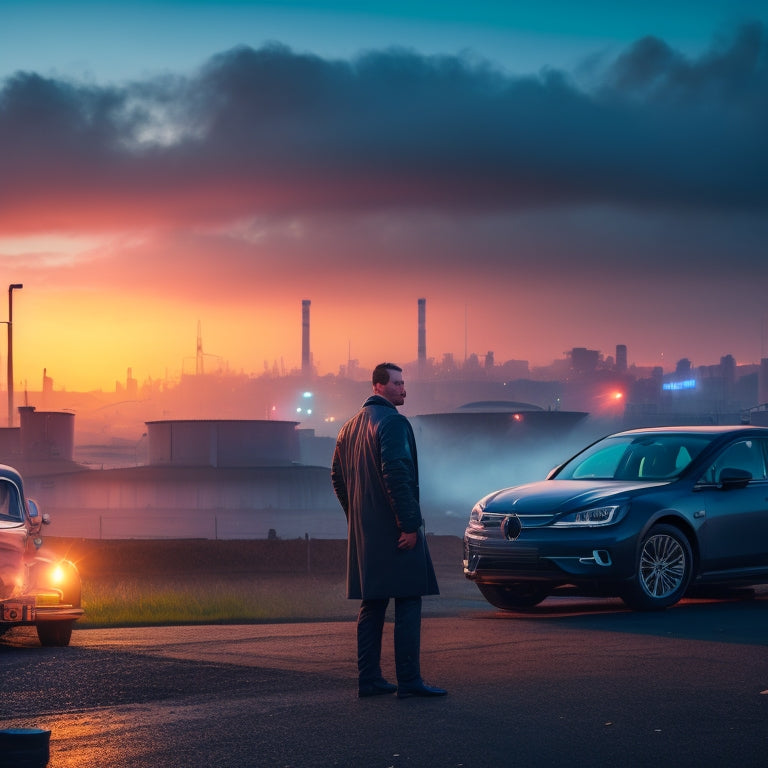
EV Enthusiast Feels Betrayed by Industry Claims
Share
The electric vehicle industry's marketing claims have sparked a growing sense of disillusionment among enthusiasts, who are increasingly feeling betrayed by the significant gap between promised ecological benefits and the harsh realities of EV ownership. Environmental impact and manufacturing emissions are higher than claimed, and the industry's focus on short-term gains has led to a crisis of confidence. Realignment of manufacturer promises with consumer experiences is vital, and addressing shortcomings like battery technology and charging infrastructure limitations is essential. As the industry grapples with its shortcomings, a more nuanced understanding of EVs is emerging, and a deeper exploration of these issues reveals a more complex truth.
Key Takeaways
• EV enthusiasts are reevaluating their commitment due to growing disillusionment with the industry's exaggerated claims.
• The disparity between marketing claims and the reality of owning an electric vehicle has led to a crisis of confidence.
• Manufacturers' promises often don't align with consumer experiences, causing frustration among EV enthusiasts.
• The industry's failure to acknowledge and address EV shortcomings has eroded trust among customers.
• Regaining trust requires a more realistic understanding of electric vehicles, acknowledging their limitations and working to improve them.
Environmental Impact and Alternatives
While electric vehicles are often touted as a panacea for environmental ills, their production process reveals a more nuanced story, with manufacturing emissions nearly 70% higher than their gas-guzzling counterparts.
The lithium-ion batteries that power electric cars are particularly energy-intensive to produce, contributing to this emissions disparity. However, researchers are working to develop lighter, faster-charging solid-state batteries that could mitigate this issue.
Additionally, hydrogen fuel is emerging as a promising alternative, with fuel cells weighing half of lithium-ion batteries.
As the automotive industry continues to evolve, it's essential to consider the environmental implications of our choices and explore innovative solutions like battery technology and hydrogen fuel to create a more sustainable future.
Whole Life Cycle and Business
Beyond the production phase, the environmental impact of electric vehicles is also influenced by the average ownership period. The current three-year cycle driven by leasing contributes to a higher carbon footprint. This short-term thinking hinders long-term sustainability.
A shift towards a more circular business model is necessary. The focus should be on retaining existing cars while reducing their polluting effect. This approach can vastly reduce CO2 emissions.
To achieve this, the industry must undergo a business transformation. Prioritizing sustainable practices and encouraging consumers to keep their vehicles for longer periods is key.
Challenges and Solutions Ahead
As the electric vehicle industry continues to evolve, concerns over the environmental impact of lithium-ion batteries, the limitations of charging infrastructure, and the need for alternative fuels have emerged as key challenges that must be addressed to achieve a sustainable future.
To overcome these hurdles, the industry must focus on:
-
Advancements in battery technology, such as solid-state batteries, to reduce environmental impact and increase efficiency.
-
Expansion of charging infrastructure, including fast-charging networks and standardized charging systems, to alleviate range anxiety.
-
Development of alternative fuels, such as hydrogen and synthetic fuels, to provide viable alternatives to traditional lithium-ion batteries.
Expectation Vs. Reality Checks
Many EV enthusiasts are reevaluating their commitment to the technology, citing a growing sense of disillusionment stemming from the disparity between manufacturers' marketing claims and the reality of owning an electric vehicle.
The gap between expectations and reality has led to a crisis of confidence among early adopters. Reality checks are needed to reconcile the promises of manufacturers with the actual consumer experiences.
The industry must acknowledge the shortcomings of EVs and work to address them. By doing so, they can regain the trust of their customers and foster a more informed and realistic understanding of electric vehicles.
This reality check is essential for the long-term success of the EV industry.
Frequently Asked Questions
How Do I Properly Dispose of My Old EV Battery?
"Properly dispose of your old EV battery by identifying local recycling facilities that adhere to environmentally responsible practices, ensuring responsible battery recycling and minimizing environmental impact."
Can I Charge My EV With a Regular Household Outlet?
Yes, you can charge your EV with a regular household outlet, but it's a Level 2 charging method, ideal for overnight charging, not road trip readiness, which requires faster charging infrastructure for efficient long-distance travel.
Are There Any EV Models With Removable Batteries for Upgrade?
While some EV models offer modular battery designs, few allow for removable batteries for upgrade. Battery swapping, a promising concept, is still in its infancy, with only a few companies, like NIO, pioneering this upgrade cycle-friendly approach.
Do EVS Have Spare Tires and How Do I Change Them?
While electric vehicles often lack spare tires, some models offer run-flat tires or tire repair kits; proper tire pressure and wheel wellness maintenance are essential, as they can impact range and overall vehicle performance.
Can I Tow an EV if the Battery Is Completely Drained?
In the event of a completely drained battery, towing an EV requires specialized equipment and caution to avoid damaging the vehicle; seeking professional tow truck assistance or roadside rescue service with EV expertise is crucial.
Related Posts
-

Smart Energy: Greener Homes With Connected Power Devices
You can control and optimize your energy consumption with smart energy devices, reducing your carbon footprint by up ...
-

7 Solar-Safe Window Solutions for Earth-Conscious Homeowners
As an earth-conscious homeowner, you're likely keen to find solar-safe window solutions that align with your values. ...
-

10 Green Waste Solutions Every Homeowner Should Know
You can make a significant impact on the environment by implementing green waste solutions at home. Consider composti...


